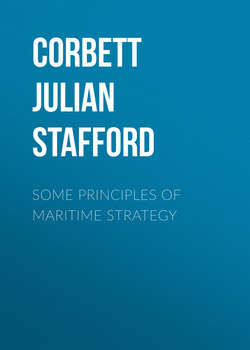Some Principles of Maritime Strategy

Реклама. ООО «ЛитРес», ИНН: 7719571260.
Оглавление
Corbett Julian Stafford. Some Principles of Maritime Strategy
INTRODUCTION
The Theoretical Study of War—Its Use and Limitations
PART ONE. THEORY OF WAR
CHAPTER ONE. THE THEORY OF WAR
CHAPTER TWO. NATURES OF WARS— OFFENSIVE AND DEFENSIVE
CHAPTER THREE. NATURES OF WARS— LIMITED AND UNLIMITED
CHAPTER FOUR. LIMITED WAR AND MARITIME EMPIRES—
CHAPTER FIVE. WARS OF INTERVENTION—LIMITED INTERFERENCE IN UNLIMITED WAR
CHAPTER SIX. CONDITIONS OF STRENGTH IN LIMITED WAR
PART TWO. THEORY OF NAVAL WAR
CHAPTER ONE. THEORY OF THE OBJECT—COMMAND OF THE SEA
CHAPTER TWO. THEORY OF THE MEANS—THE CONSTITUTION OF FLEETS
CHAPTER THREE. THEORY OF THE METHOD—CONCENTRATION AND DISPERSAL OF FORCE
PART THREE. CONDUCT OF NAVAL WAR
CHAPTER ONE. INTRODUCTORY
I. INHERENT DIFFERENCES IN THE. CONDITIONS OF WAR ON LAND AND ON SEA
II. TYPICAL FORMS OF NAVAL OPERATIONS
CHAPTER TWO. METHODS OF SECURING COMMAND
I. ON OBTAINING A DECISION
II. BLOCKADE
CHAPTER THREE. METHODS OF DISPUTING COMMAND
I. DEFENSIVE FLEET OPERATIONS—"A FLEET IN BEING"
II. MINOR COUNTER-ATTACKS
CHAPTER FOUR. METHODS OF EXERCISING COMMAND
I. DEFENCE AGAINST INVASION
II. ATTACK AND DEFENCE OF TRADE
III. ATTACK, DEFENCE, AND SUPPORT OF MILITARY EXPEDITIONS
APPENDIX. THE "GREEN PAMPHLET"
WAR COURSE. NOTES ON STRATEGY
PART ONE. GENERAL PRINCIPLES AND DEFINITIONS
PART TWO. NAVAL STRATEGY CONSIDERED AS A QUESTION OF PASSAGE AND COMMUNICATION
Отрывок из книги
At first sight nothing can appear more unpractical, less promising of useful result, than to approach the study of war with a theory. There seems indeed to be something essentially antagonistic between the habit of mind that seeks theoretical guidance and that which makes for the successful conduct of war. The conduct of war is so much a question of personality, of character, of common-sense, of rapid decision upon complex and ever-shifting factors, and those factors themselves are so varied, so intangible, so dependent upon unstable moral and physical conditions, that it seems incapable of being reduced to anything like true scientific analysis. At the bare idea of a theory or "science" of war the mind recurs uneasily to well-known cases where highly "scientific" officers failed as leaders. Yet, on the other hand, no one will deny that since the great theorists of the early nineteenth century attempted to produce a reasoned theory of war, its planning and conduct have acquired a method, a precision, and a certainty of grasp which were unknown before. Still less will any one deny the value which the shrewdest and most successful leaders in war have placed upon the work of the classical strategical writers.
The truth is that the mistrust of theory arises from a misconception of what it is that theory claims to do. It does not pretend to give the power of conduct in the field; it claims no more than to increase the effective power of conduct. Its main practical value is that it can assist a capable man to acquire a broad outlook whereby he may be the surer his plan shall cover all the ground, and whereby he may with greater rapidity and certainty seize all the factors of a sudden situation. The greatest of the theorists himself puts the matter quite frankly. Of theoretical study he says, "It should educate the mind of the man who is to lead in war, or rather guide him to self-education, but it should not accompany him on the field of battle."
.....
It will be observed, as was natural enough, that all through his work Clausewitz had in his mind war between two contiguous or at least adjacent continental States, and a moment's consideration will show that in that type of war the principle of the limited object can rarely if ever assert itself in perfect precision. Clausewitz himself put it quite clearly. Assuming a case where "the overthrow of the enemy"—that is, unlimited war—is beyond our strength, he points out that we need not therefore necessarily act on the defensive. Our action may still be positive and offensive, but the object can be nothing more than "the conquest of part of the enemy's country." Such a conquest he knew might so far weaken your enemy or strengthen your own position as to enable you to secure a satisfactory peace. The path of history is indeed strewn with such cases. But he was careful to point out that such a form of war was open to the gravest objections. Once you had occupied the territory you aimed at, your offensive action was, as a rule, arrested. A defensive attitude had to be assumed, and such an arrest of offensive action he had previously shown was inherently vicious, if only for moral reasons. Added to this you might find that in your effort to occupy the territorial object you had so irretrievably separated your striking force from your home-defence force as to be in no position to meet your enemy if he was able to retort by acting on unlimited lines with a stroke at your heart. A case in point was the Austerlitz campaign, where Austria's object was to wrest North Italy from Napoleon's empire. She sent her main army under the Archduke Charles to seize the territory she desired. Napoleon immediately struck at Vienna, destroyed her home army, and occupied the capital before the Archduke could turn to bar his way.
The argument is this: that, as all strategic attack tends to leave points of your own uncovered, it always involves greater or less provision for their defence. It is obvious, therefore, that if we are aiming at a limited territorial object the proportion of defence required will tend to be much greater than if we are directing our attack on the main forces of the enemy. In unlimited war our attack will itself tend to defend everything elsewhere, by forcing the enemy to concentrate against our attack. Whether the limited form is justifiable or not therefore depends, as Clausewitz points out, on the geographical position of the object.
.....